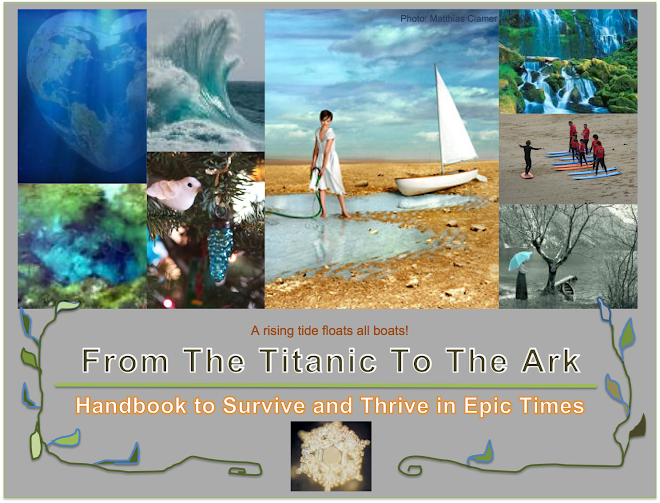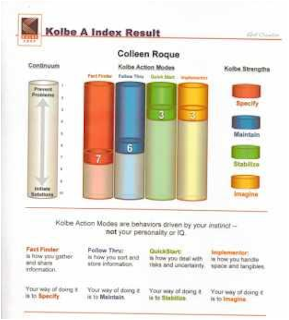Here is a very useful distinction as a starting point from Steven Covey’s The 8th Habit where he writes – “There’s a common misconception that a person’s skill is their talent. Skills, however, are not talents. Talents, on the other hand, require skills. People can have skills and knowledge in areas where their talents do not lie. If they have a job that requires their skills but not their talents, organizations will never tap into their passion or voice. They’ll go through the motions, but this will only make them appear to need external supervision and motivation.”
Monday, February 8, 2010
Find Your Dream Job By Using Your Unique Talents and Genius
“All children are born geniuses; 9,999 are swiftly and inadvertently degeniusized by grownups." Buckminster Fuller
Talents Versus Skills
Here is a very useful distinction as a starting point from Steven Covey’s The 8th Habit where he writes – “There’s a common misconception that a person’s skill is their talent. Skills, however, are not talents. Talents, on the other hand, require skills. People can have skills and knowledge in areas where their talents do not lie. If they have a job that requires their skills but not their talents, organizations will never tap into their passion or voice. They’ll go through the motions, but this will only make them appear to need external supervision and motivation.”
Here is a very useful distinction as a starting point from Steven Covey’s The 8th Habit where he writes – “There’s a common misconception that a person’s skill is their talent. Skills, however, are not talents. Talents, on the other hand, require skills. People can have skills and knowledge in areas where their talents do not lie. If they have a job that requires their skills but not their talents, organizations will never tap into their passion or voice. They’ll go through the motions, but this will only make them appear to need external supervision and motivation.”
“The key to creating passion in your life is to find your unique talents and your special role and purpose in the world. It is essential to know yourself before you decide what work you want to do”.
What and How of Talents
Talents can be understood in terms of ‘what you do and importantly, how you do it.’
When we recognize that we have striving instincts and are free to use them, our instincts can become our energy sources that propel us toward personal productivity. The job of leaders is to manage for results rather than manage the process.
As Kathy Kolbe writes in her book Pure Instinct, “The joy in the creative process comes through productive effort. When all hope for attaining the thrill of success is put out of reach, it follows that many people will turn to artificial ‘highs’. History will undoubtedly take note of our era, one in which human beings’ instincts to strive have been largely ignored. Substance abuse is rampant, along with crime, suicide, and failed relationships. Self-confidence, the by-product of productivity, has eroded along with the economy.”
Acting on Instinct
Kathy Kolbe has identified four primary sources of energy:
The probing instinct creates a need to investigate in depth.
The patterning instinct causes us to seek a sense of order.
The innovating instinct is the force behind experimentation.
The demonstrating instinct converts ideas into tangible form.
Each of us operates using these four sources of energy however we do so from differing perspectives or operating zones. We either 'will',' won’t' or 'be willing'.
Freedom To Be Yourself
Kathy says, “My definition of success – the freedom to be yourself – is tied to the Striving Instincts and their Operating Zones. Successful people are those who have found paths that allow them to use their instinctive powers freely without stepping on others."
Action Modes
Each action mode leads us to perform in a certain way.
Fact Finder is the instinct to probe – relating to gathering information – some people have to define their options and examine possibilities in great depth becoming experts or authorities in specific areas while others are generalists who attack a broader scope of pursuits
Follow Through is the instinct to pattern – relating to structure – ranging from acting sequentially to sporadically
Quick Start is the instinct to innovate – relating to a perspective of risk – ranging from being highly negotiable to irrevocable – people who initiate Quick Start create the chaos that others have to clean up but in the process these change makers add vision and risk to the mix
Implementor is the instinct to demonstrate – relating to objects and physical space – through use of three dimensional or tangible implements or tools – some people are hands-on needing movement and space, building solutions rather than talking about them
True Equality
“Everyone has the same amount of instinctive power – and an equal need to act freely according to those instincts.”
Examples
Here is my Kolbe Index A - briefly I am an 'Innovator' - in other words I will use innovation to problem solve. Starting with my longest Striving Instinct since that mode is the most predominant - I initiate in Quick Start (long green) creating innovation and original ideas, seeking challenges, taking risks and acting on intuition.
Here is the Koble Index A for my friend Colleen (see her profile) - she is a 'Strategic Planner' - who uses a strategic way of problem solving. We are unalike and therefore highly complementary - we make a great team. Starting with her longest Striving Instinct which is her most predominant, Colleen initiates in Fact Finder so she will collect data, analyze, define options and examine possibilities and in Follow Through, she follows procedures, maintains order and she completes what she sets out to do. In Quick Start she is a great check by providing stability to my instinct for innovation and risk.
Coping
Imagine the freedom and relief for the Quick Start child who has to contend with a school system designed by Follow Throughs that works best for students with the same profile - that Quick Start child could be considered ADD (Attention Deficit Order) to a teacher struggling to maintain order and a systematic approach within the classroom. Kathy once told a Quick Start child, who wanted to be a musician, to consider the teacher to be like the band leader who keeps everyone on the same page - this helped the child to understand in his own terms how to create harmony with his teacher's mode of striving. The shift can be that simple!
Famous People
Follow Throughs - Aristotle created the terminology that scientists use today - he was the great organizer who founded and classified the various sciences; Melvil Dewey set up the Dewey Decimal System for library classification.
Implementors - Thomas Edison worked with physical objects in all his experimentation.
5% of the population will have your particular MO whereas 95% of people won't be able to do it your way! That allows each of us to appreciate that we have unique talents to contribute and by being free to do so, can create joy and fulfillment all around!
Quick Tip: Taking your Kolbe Index A takes about 20 minutes by answering approximately 40 most likely/least likely questions - the Index A result is good for life since in most instances your Striving Instinct varies little if at all throughout your lifetime. You can visit Kathy Kolbe’s site to take the Index A on-line.
Also visit Oprah's site for an article written by Martha Beck to give you her summary of the Kolbe wisdom.
Labels:
creative,
genius,
leadership,
problem solving,
unique talents
Subscribe to:
Post Comments (Atom)















0 comments:
Post a Comment